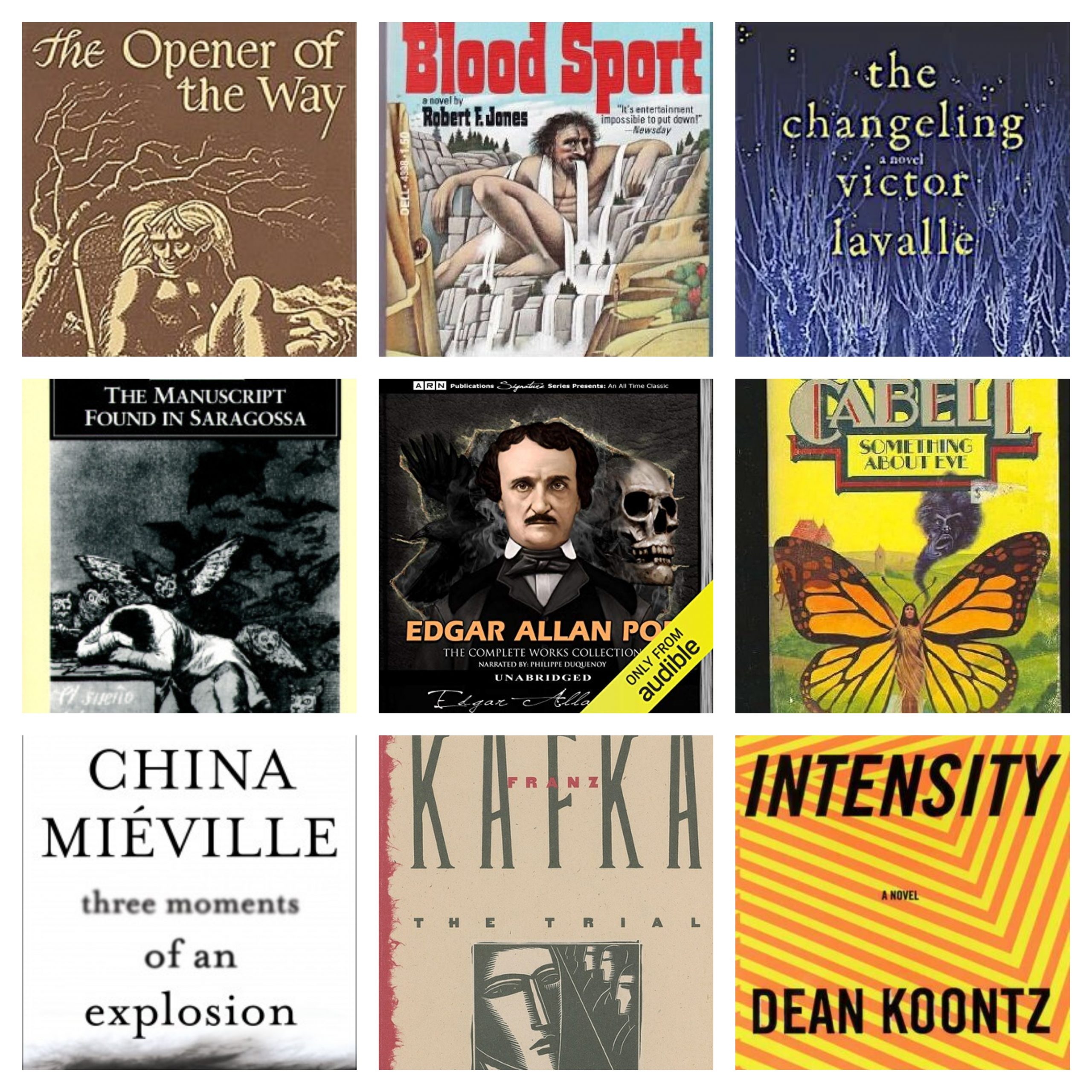Greetings, folks! Been quite a while since I’ve posted one of these, although rest assured I have not abandoned the project by any means. I’ve just been super busy with other stuff and haven’t had a chance to post until now. In this Super-Sized Edition, I’ll be delivering up ten write-ups instead of the usual five as an amends for the delay. We’ve got some great stuff in here too! From the complete works of the grandaddy of terror and mystery to the modern weird and from anxiety-riddled absurdity to a Dean Koontz book that ISN’T terrible, lots of surprises are in store!
For those just joining me, this is my journey through the following “Best of” Horror lists:
Reedsy Discovery Best Horror Books
Stephen Jones & Kim Newman’s Horror: 100 Best Books
Stephen Jones & Kim Newman Horror: Another 100 Books
If you want to check out my previous entries, they can be found here:
Part 38 | Part 37 | Part 36 | Part 35 | Part 34 | Part 33 | Part 32 | Part 31 | Part 30 | Part 29 | Part 28 | Part 27 | Part 26 | Part 25 | Part 24 | Part 23 | Part 22 | Part 21 | Part 20 | Part 19 | Part 18 | Part 17 | Part 16 | Part 15 | Part 14 | Part 13 | Part 12 | Part 11 | Part 10 | Part 9 | Part 8 | Part 7 | Part 6 |Part 5 | Part 4 | Part 3 | Part 2 | Part 1
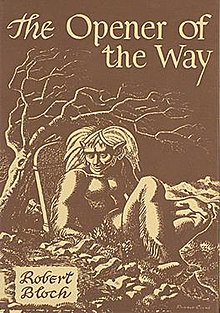
The Opener of the Way (Robert Bloch, 1945)
List: Jones/Newman
This go-round we have Robert Bloch’s classic Arkham House short story collection, The Opener of the Way. I’ve already talked about Bloch’s famous novel Psycho, but now we’re going back to his pulp roots, many of the stories originating in that seminal horror mag Weird Tales. Not surprisingly several of the stories use H. P. Lovecraft’s Cthulhu mythos but with Bloch giving his own fresh perspective on those nameless monstrosities and withering tomes. The best of these is probably “The Faceless God” with its blend of the Lovecraftian and Egyptian mythology, a combination that I think works quite well. In fact, he has a few other stories that use Egyptology to great effect here. “The Mannikin” is another very good Lovecraft-influenced one that very much reflects the Weird Tales ethos. And then “The Dark Demon” is an interesting almost meta story featuring a thin-veiled H. P. Lovecraft surrogate who becomes too immersed in his own dark imaginings. “The Cloak” is a fun Halloween story that I suspect R. L. Stine was thinking about when he came up with the popular Goosebumps story The Haunted Mask. “Yours Truly, Jack the Ripper” is one of Bloch’s most acclaimed stories and with good reason. Fusing a gaslit gothic atmosphere with a more modern sensibility and a memorable twist ending that has become something of a cliché in the wake of its influence, it really is a great story. Some stories like “Seal of the Satyr” and “The Fiddler’s Fee” are more traditional tales that I’ve seen told before, but Bloch manages to put something of a fresh spin on them to justify their placement here. Bloch even includes a couple of yarns that would be more properly classified as science fiction, “The Strange Flight of Richard Clayton” and “One Way to Mars”. Going back to his Egyptian themes, another one I quite enjoyed was “The Secret of Sebek” and its sequel “The Eyes of the Mummy”, both having a very Weird Tales vibe that I quite enjoyed. Overall, these stories mostly have the feel of a writer early in his career exploring and trying to figure out what most energizes him, absorbing the influences of his mentors and peers but also injecting his own more contemporary style into the proceedings.
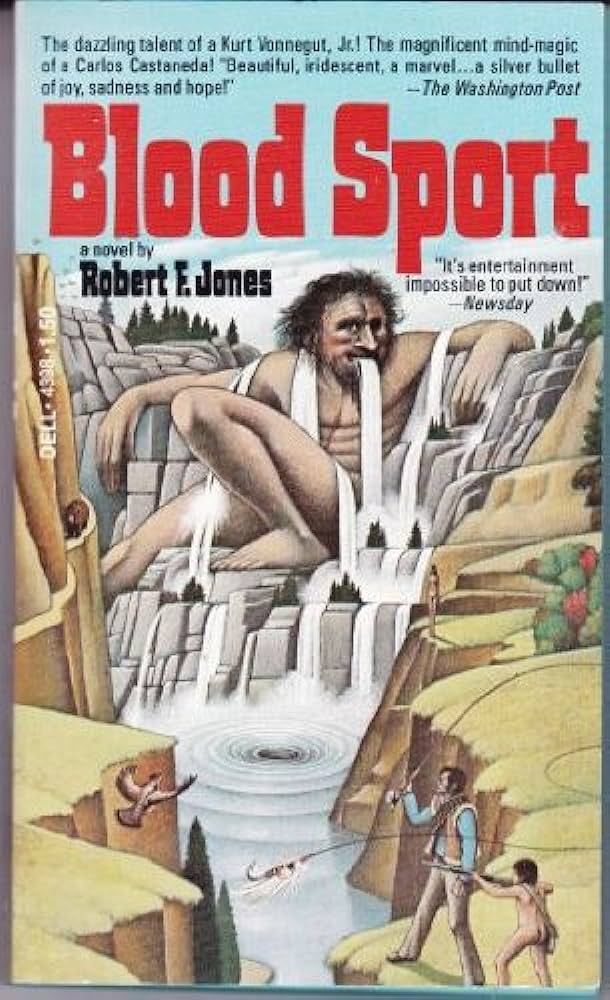
Blood Sport (Robert F. Jones, 1974)
List: Jones/Newman
A father and son travel to the mighty Hassayampa River, with its headwaters in the remote regions of China and its mouth in New York, where the father hopes to teach his son how to be a man and not a coward. Slaying prehistoric mammoths and fishing for pedestrians are par for the course on the Hassayampa, and everything’s going great until an incident occurs which sparks the son running off to join a group of nomad bandits who live in the uplands of the river led by the gnarled, foul and just plain mean character called Ratnose. Ratnose teaches the boy how to live off the land, free and wild, to hunt, to fuck, to be. Meanwhile the father turns into a vengeance-fueled killing machine trying to track down the son. When the father and Ratnose cross paths, they enter into a deadly duel where no one may come out alive.
I enjoyed this one quite a bit. At its heart it’s part adventure novel, part coming-of-age tale of manhood dealing with the emotional tension wire between father and son. But it’s fashioned within a truly bizarre magical realist narrative with a real nasty bite to it that feels at times like the tall tales of old. This is a book that definitely does not shy away from the darker side of life, portraying a kind of finely balanced hedonism that exudes both a sense of constant menace as well as ebullient joy. Having said that, I don’t really see it as a horror novel necessarily although it does have some horrific flourishes. Regardless, this dark, rustic fantasy is definitely worth checking out. It’s totally unique and imminently readable with a strange and memorable climax.
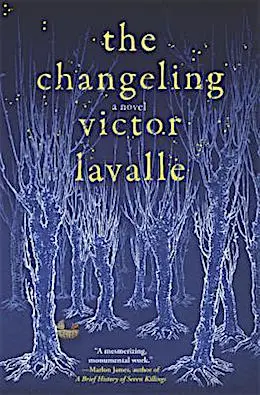
The Changeling (Victor LaValle, 2017)
List: Reedsy Discovery
Apollo is a book man, not just a man who reads books but a man who hunts for treasure amidst dusty old boxes in basements, dealing in the rare and valuable. Apollo has a wonderful and spirited wife Emma Valentine and a newborn baby Brian. But suddenly Apollo finds his Disney fairy tale existence of a seemingly ‘happily ever after’ becoming a nightmarish old world fairy tale that leads Apollo into very dark places where he has to confront not only what kind of man he is but also what he’s willing to do to get peace of mind. His true quest begins after a shocking and brutal incident that leads him initially on a path of revenge that slowly transforms into something else, something more important.
I’m intentionally being a little vague in the plot summary above because part of the enjoyment of LaValle’s great book is seeing how the twists and turns in the narrative unravel and come back together in interesting ways. I’ve discussed two LaValle books in this big project already (Devil in Silver and Ballad of Back Tom) and in both instances I praised LaValle’s crisp and clean but emotionally-driven prose. The Changeling offers more of this imminently readable style. LaValle has a knack for character and world building. In Devil in Silver, we really grew to care about the denizens of a mental institution, and in Black Tom, the character of Tommy Tester lives and breathes. The Changeling gives us even more to care about. We truly do care about Apollo and the trials he goes through. We care about Emma and gradually grow to understand her by the end as well. LaValle also makes New York really come alive here, setting a tone for what feels like the real New York and not the Hollywood version that many may conjure up in their minds when they attempt to paint a picture of the Big Apple. LaValle also has a great sense of pacing, slowly unfurling plot points in meaningful ways and making it a real page turner. I did have a couple of minor quibbles with a couple of plot points here and there but ultimately I thought this was overall another very fine effort from LaValle and definitely worth checking out.
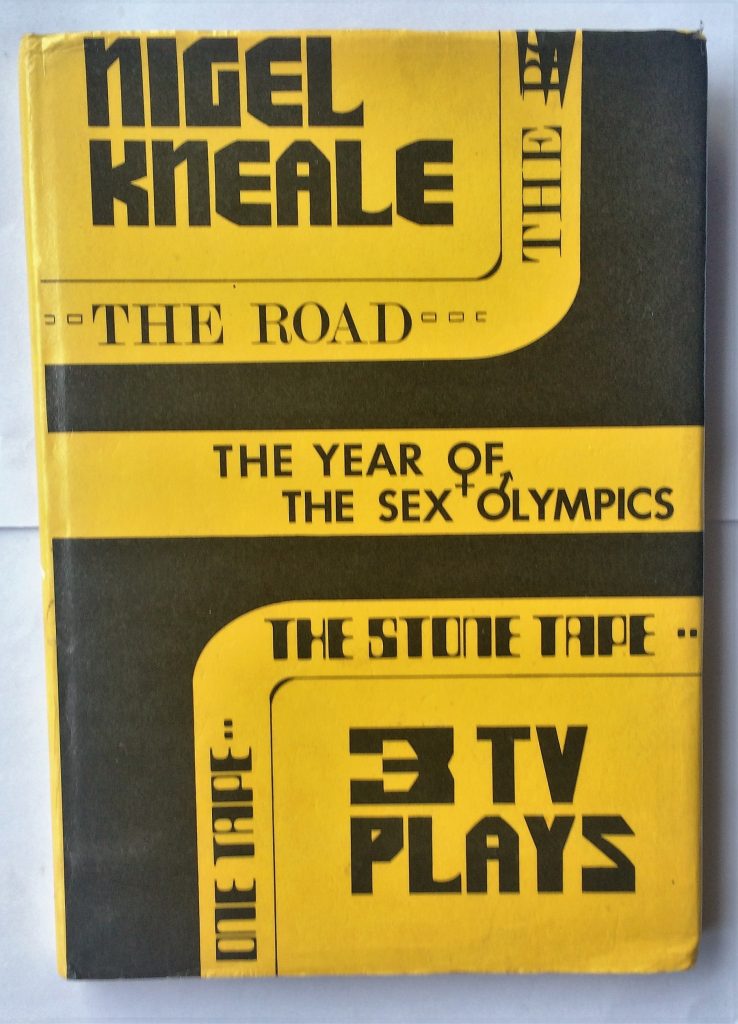
Year of the Sex Olympics: Three Television Plays (Nigel Kneale, 1968)
List: Jones/Newman
Nigel Kneale was a celebrated writer of film and television much of which was of the sci-fi and horror genres. He’s perhaps most well-known for creating the well-known Professor Quatermass, who always seems to find him at the center of particularly terrifying science fiction phenomena. Kneale also did film scripts for the likes of Hammer (Abominable Snowman, The Witches) and even Hollywood (Halloween III: Season of the Witch). But he often worked in television. Collected in this book are three of his more well-regarded teleplays: Year of the Sex Olympics, The Road and The Stone Tape.
Year of the Sex Olympics takes place in a dystopian future where an elite group of humanity (the high-drive) have developed a means of combating over-population in the dull and plodding low-drive populace by creating the most extreme, debauched television programming possible, the idea being that people will be too distracted by watching shows like Super Sex to procreate and bring more dullards into the world. Unfortunately even the most erotic, skilled sex acts and the most ridiculous acts of gluttony imaginable are barely keeping the low-drive occupied. That is, until a crazed man trying to get his disturbing drawings on the air falls to his death on live TV, eliciting mad laughter in the low-drive populace. This inspires one of the Super Sex TV programmers to take a previous mate of his who he shares a child with and live in isolation in a cabin with no modern conveniences, broadcasting 24/7 and giving the low-drives something unpredictable to watch. Unbeknownst to them, the network has come up with other ideas to make it even more unpredictable. The Road is a bizarre teleplay involving an 18th-century village that begins to witness visions of a terrible future and was the first script he wrote for the BBC after leaving for several years to do film work. The Stone Tape is another of Kneale’s more well-known teleplays. The story involves a group of scientists who set up shop in an old Victorian mansion rumored to be haunted. They attempt to discover the presence of the paranormal by use of scientific methods. When one particular researcher discovers a possible theory for the manifestations they’ve been seeing involving the very masonry of the estate being imprinted with trauma of past years, they discover something more disturbing than they thought possible.
Kneale was a master of fusing science and horror in unique and inventive ways, and his scripts actually read very well in book form. Year of the Sex Olympics in particular benefits from being read to truly soak in the bizarre future dialect the characters speak in. Sex Olympics is doubly impressive for the sheer amount of world building it does in such a short amount of time while avoiding massive exposition dumps. It also presages reality TV to an uncanny degree, so that’s pretty cool too. I’ve seen the television adaptation of Year of the Sex Olympics and thought it did a solid job of adapting Kneale’s intelligent script, but the original screenplay is definitely beneficial to check out to pick up on all the dialectical nuance of this future language. The Road I was a little less impressed with as it does not avoid a few very big exposition dumps. But it has a very good ending that still makes it worth checking out. The Stone Tape is perhaps the best of the three, a very interesting and unique haunted house story with a clever sci-fi twist. Additionally, Kneale’s crisp script is fully of evocative but terse narration not typically seen in a screenplay like this. It paints a very clear picture of what Kneale wanted to convey of the story without falling into verbose, novel-like prose.
One example from the script to give you an idea of the style in which it is written:
They hurry off along the passage. Jill shivers. It is cold here, the chill suddenly striking. She follows.
As the men’s footsteps fade they seem to echo inside the room. Curiously changed, though – this is a rapid pattering.
The effect is so startling that Jill spins round expecting to see another person. And finds nobody. She forces calm on herself and makes for the door. As she reaches it the sense of another presence behind her is overwhelming. She halts and steadies herself against the doorpost. Quite deliberately, she turns to look.
And sees a figure.
Highly readable yet gives all important information a director would need to bring his vision to life. Excellent script writing for an excellent story. While I don’t normally think reading scripts are entirely necessary to understanding the piece they are adapted into, in the case of these Kneale scripts, I think they are indeed worth tracking down if you are a fan of Kneale’s work. Reading them really gave me an even greater appreciation for Kneale than I already had.
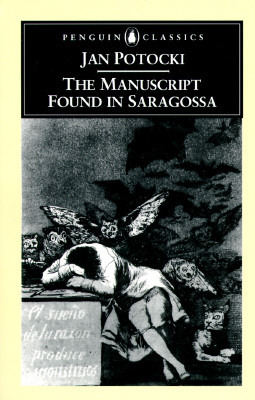
The Manuscript Found in Saragossa (Jan Potocki, 1805)
List: Jones/Newman
Our narrative for which this entire sprawling, densely layered novel springs forth from is a Walloon soldier of the Spanish Army named Alphonse (although the whole thing is structured as a found manuscript 4o years after it was written). Much of the narrative is spent in the company of a gypsy chief who tells his life story to the travelers accompanying him over the course of sixty-six days. In addition to Alphonse, we meet a cabbalist who purports to have a dark and supernatural control over the legendary Wandering Jew. We meet Velasquez, a hyper-literal mathematician who expounds on his view of religion and of the structure of the universe in general and the system in which he has built his life around. Alhponse goes to bed with cousin temptresses but wakes up next to two corpses beneath a hangman’s gallows. But this is merely a pretense to bring Alphonse along into the fold of these stories within stories within stories within stories much in the vein of a sprawling work such as the Arabian Nights but much more strange.
How is that a novel can be so needlessly complicated and yet imminently readable at the same time? Manuscript in Sargossa isn’t always engaging (the tedious rote summaries of biblical stories from the Wandering Jew in particular seem to drag but at least they aren’t that long and at least the characters in the story themselves seem to agree with me) but it is certainly interesting more often than not. While this does have mysterious happenings such as nightly transferences, eerie spectral phenomena, ghosts emerging from portraits and other supernatural events, I wouldn’t necessarily call this book a horror novel. It does certainly have an eeriness to it at times but really the stories woven throughout the book run the gamut from high-spirited adventures to farcical comedy to sweeping melodramatic romance and all other manner of tales under the sun. Having said that, the book is full of murder, double crosses, betrayals and all sorts of other dark and devious subject matter. Its stories of high intrigue and villainy at times does remind me of the massive novel The Wandering Jew that I read earlier in this challenge (although this predates that novel). Frankly, I don’t think I could properly summarize this book the way I feel like is needed. I think I’d probably need some kind of massive tree/bar chart showing a breakdown of each of the stories and the other stories from which they spring. Suffice it to say, if you want to dive headfirst into a supremely otherwordly, slyly humorous book of adventure and intrigue and don’t mind being perplexed and confounded at times, then I think you will find The Manuscript Found in Sargossa a bounty of riches.

The Complete Works of Edgar Allan Poe (Edgar Allan Poe, 1827,1849)
Lists: Jones/Newman [Tales of Mystery & Imagination], NPR [“The Tell-Tale Heart”], Reedsy Discovery [Narrative of Arthur Gordon Pym of Nantucket & Fall of House of Usher and Other Stories]
While I had read many of Poe’s most popular horror and mystery tales, I hadn’t read The Narrative of Arthur Gordon Pym of Nantucket. But I thought, why not take this opportunity and just go through Poe’s entire bibliography? I happened to have a Complete Works audiobook collection, so I put it on and proceeded to go through 48 hours of Poe, immersing myself in his stories, poems and essays. Since I’m talking about such a large sprawling collection, my comments may be a bit scattered. But hopefully I can convey my impressions well enough to give an idea of what it was like exploring everything this master of the written form provided.
I’ll start off talking about his horror and crime tales for which he is most well-known. Many of these are deservedly stone-cold classics. Stories like “The Cask of Amontillado” and “The Black Cat” (both with similar schemes) are solid stories that hold up pretty well but are relatively straight forward. For whatever reason on this go-through, “The Tell-Tale Heart” actually didn’t strike me as one of his best. There seems to be a lack of cohesion in theme between the fixation on the old man’s eye and the beating of his heart that just didn’t come together for me this time. Stories like “Masque of Red Death” and “Fall of the House of Usher” showed Poe at his most atmospheric, taking his time in setting tone and place. Surprisingly one that most improved on a re-reading was “The Pit and the Pendulum” to the point that I think this story may be a master class in building tension and suspense. Oddly enough, the stories that worked possibly the least for me this go-round was his mystery stories like “Murders in the Rue Morgue”, “The Mystery of Marie Rogêt”” and “The Purloined Letter”. I can certainly see how influential Poe’s detective Dupin was in the evolution of the mystery novel, but I just found the stories themselves excessively wordy and repetitive with Dupin’s explanations being extremely bloated and needlessly detailed. Part of what made a detective like Sherlock Holmes more compelling is that while Holmes was similarly detail-oriented, Doyle made Holmes a bit of an asshole which allowed him to truncate explanations in an air of appearing superior to those around him, giving them enough explanation without being exasperating. “The Gold Bug” was still a pretty fun adventure yarn though, and “Descent into the Maelstrom” was an excellent story that generates terror through the sheer force of mother nature. Another story I found interesting though I hadn’t really given much thought to was “William Wilson”, Poe’s bizarre doppelgänger tale. “The Oblong Box” was another I didn’t remember very well but had Poe conjuring up a truly memorable, uneasy mystery on-board a ship. Some horror tales I found a little tedious, particularly “The Premature Burial” much of which just plays out more as an essay on the titular subject, ending on an almost farcical note. Some are just strange and vague like “The Tale of the Ragged Mountains” which had a very dream-like feel to it.
One area that I never really see associated with Poe is science fiction, yet he did indeed write several such stories. Interestingly, several of them were originally presented as real stories, intentionally designed as hoaxes, such as “The Unparalleled Adventure of One Hans Pfaall”, “The Balloon Hoax” (obviously not actually titled this on its original publication) and “Von Kempelen and His Discovery”. Frankly showing Poe at his most obsessively detailed, I found these stories to be EXTREMELY tedious. Still I have to admire Poe for putting so much thought into how these kinds of journeys could possibly function. I also have to wonder if these stories were an influence on Jules Verne. They strike me as very similar in theme to several of his.
Another style of story often not associated with Poe is the humorous tale. Yet Poe actually wrote quite a few. In fact, his first several published stories were more in a comedy vein. His inmates-taking-over-the-asylum story “Metzengerstein” probably falls into this bucket. Despite the horrific premise, it does seem to be written with tongue in cheek. A lot of his comedy stories just come across silly and fairly one note like “X-ing a Paragrab” (this is one I had to go back and read in print later though since it really didn’t translate well in audio form) and “Three Sundays in a Week” where Poe commits the eternal sin of over-explaining the joke. “Diddling” was just stupid. “The Spectacles” was actually a fairly clever if totally preposterous one though.
By far, the least interesting chunk of this collection is comprised of the non-fiction essays Poe wrote. While the subjects in and of themselves aren’t devoid of interest, like the famous fraudulent automaton chess machine (“Maelzel’s Chess Player”), the extremely dry and overly detailed tone in which Poe delves into the subject becomes extremely tiresome, particularly considering they are some of the longest works in the collection.
Finally we arrive at the reason which brought me here in the first place, Poe’s lone finished novel The Narrative of Arthur Gordon Pym of Nantucket. I had built up some very high, perhaps unreasonable, expectations for this one due to its influence on modern horror literature and in particular H. P. Lovecraft. Pym is even referenced in “In the Mountains of Madness”. Pym tells the story of a young man whose adventures on the high seas leads him through a cavalcade of trials and obstacles on his journey south to the antarctic. The biggest surprise to me was just how much of the book was taken up with more conventional sea-faring adventure as we follow Pym through a mutiny, a shipwreck and other mishaps before the ship he finds himself aboard crosses paths with a lost tribe of cannibals. As he nears the south pole, he starts seeing odd creatures like a white gorilla but really the very end is where I think much of the influence on weird fiction has spread, as he sails into a strange, milky mist. Overall, this is a decent sea adventure yarn with a very interesting ending, but it’s not one of Poe’s best works, mostly due to again his obsession with needless detail, this time around cartographical concerns.
Overall, I’m quite glad I went through this whole collection. It was nice to revisit some old classics and discover a few new ones as well.
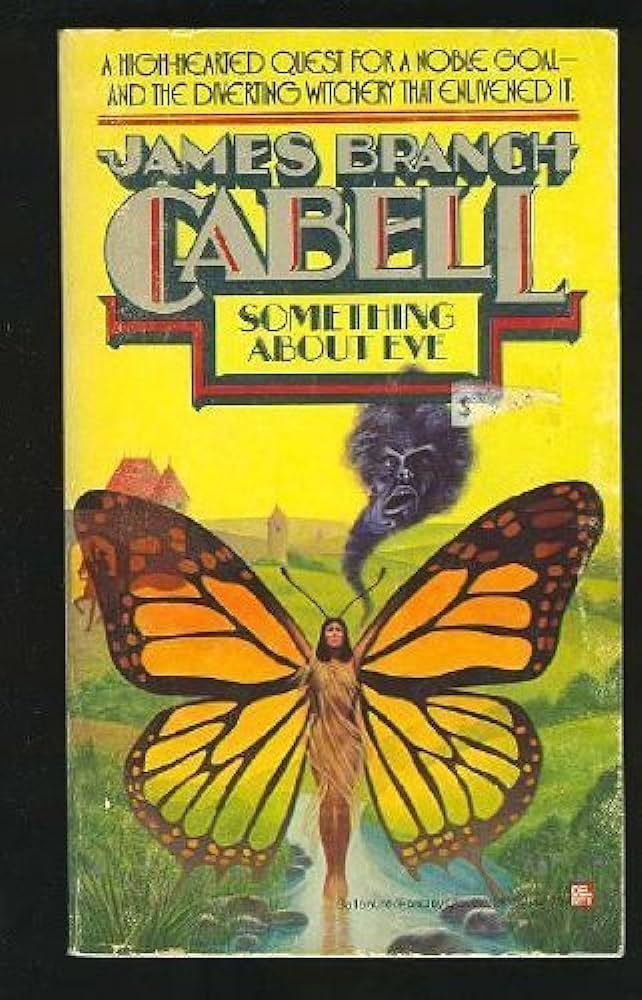
Something About Eve (James Branch Cabell, 1927)
List: Jones/Newman
Would-be author of romance Gerald Musgrave, southern gentleman and member of the Protestant Episcopal Church of the United States of America, is fated one day to meet with a Sylan and exchange his body with that of the devil in order to dedicate himself to a life in pursuit of the thaumaturgical arts. Inadvertently Gerald begins a journey on a path to godhood to reign in the eternal kingdom of Antan over all old gods and myths of legend astride the mighty silver steed Kalki. Along the way he encounters numerous temptresses in various guises, witches who turn men into animals, people who worship throbbing, blue-veined…noses… and even famous personages such as Roman emperor Nero, King Solomon and Odysseus on their want to Antan as well. Will Gerald achieve his lofty goal of reigning over that mythical land of Antan or will he be waylaid by the wiles of a pretty face or the contentment of a life well led?
This book is at equal turns frustrating, wonderfully eloquent and bitingly hilarious and satirical. Cabell seems to almost write with a nihilistic streak, with nary a positive trait to pass amongst a single character as we follow his protagonist Gerald becoming more and more enamored with his own imagined self-worth through a series of misinterpretations of turns of phrase, massive leaps of logic and wildly jumping to conclusions. Gerald frequently falls prey to the illusions that he builds up around him, deluding himself into believing in truly ridiculous things as a way to escape the drudgery of his previous life. Yet in his heart, we see that he really knows what is best for him even if he can’t admit it to himself. Delusion begets compromise on foggy expanse of Mispec Moor. Here we have another novel from Jones & Newman that I can’t really understand why it is included on a list of Best Horror Books. There’s little to no horror element present here beyond the existence of devils and witches. But it’s all played as farce. Having said that, I did enjoy it quite a bit, and it ended up being much funnier than I expected it to be. While Cabell isn’t very well-known today, he has influenced many of the biggest writers in sci-fi and fantasy out there. In his day, Cabell was great admired by the likes of Mark Twain, H. L. Menken and Sinclair Lewis and major sci-fi authors such as James Blish and Robert Heinlein have professed to have been big fans of his work. Well-known contemporary fantasy author Neil Gaiman has also mentioned Cabell’s influence on his work, particularly on The Sandman. Cabell is one of those authors that I could see developing a cult audience again if given a proper chance through someone like Valancourt for people to rediscover his works. Also as a side note, like Conjure Wife, I not only read this one, but recorded it as an audiobook for Librivox (you can listen to it here if you so desire), and I had a lot of fun with Cabell’s lurid and intricately worded amusing prose style. This is one I’d definitely suggest checking out if you are interesting in seeing some of the roots of the comedic fantasy.
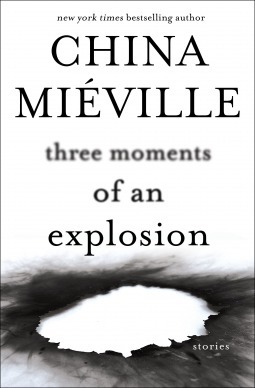
Three Moments of an Explosion: Stories (China Miéville, 2009)
List: Reedsy Discovery
China Miéville is a writer who truly embraces the title of “weird fiction” author. While most of his books can loosely be described as some combination of fantasy, science fiction and horror, they are across the board pretty weird. This collection of stories is perhaps even weirder than most of what he has produced. From utterly bizarre stories such as “Polynia” where icebergs materialize floating in space above London to “Covehithe” where we witness oil derricks rising from the sea to cavort on land as animals to the more overt horror story “Säcken” (one of the best in the book IMO), this book is chock full of strange, otherworldly incidents that often just are. “The Design” is another one of the better stories in the book, about a med student who discovers an intricately woven series of patterns on the bones of a cadaver he was assigned to practice on, becoming obsessed with them and where they came from. Were these encoded messages by…something? Or just practice for something even grander? “The Dowager of Bees” was another highlight for me, one of these ‘hidden world’ type stories like Neil Gaiman’s Neverwhere or The Lost Room TV mini-series but centered around rare and mystical playing cards that show up in poker hands on occasion with very specific positive or negative consequences associated with them. Stories like “The Junket”, “The Rabbet” and “Dreaded Outcome” seem almost quaint in comparison to many of these stories in that that they actually have more traditional story arcs to them with more defined endings. And then there are stories like “Watching God”, about an island where ships seem to sail near and sink with no explanation while the people on the island just watch on, “After the Festival”, about a group of people who had worn decapitated animal heads for a sort of pagan festival but are unable to remove the heads after it’s over, and “The Bastard Prompt” about an actress who begins to make up eerily prescient and bizarre illnesses as part of a job where she pretends to be a patient for med school students. These stories and many others in the collection do not really end. They just exist. Also peppered throughout are very short pieces like the three storyboarded movie trailers, the titular story describing an explosion from three points of view and a story of four Orpheuses. These are often interesting or amusing but rarely very fulfilling given their brevity. Overall I actually liked this collection quite a bit, but I do have a tendency to lean into the more absurd. For those of you needing your plots and stories to make sense and tie things up in a neat bow probably should not be looking into a genre tagged as “weird fiction” to begin with, eh?
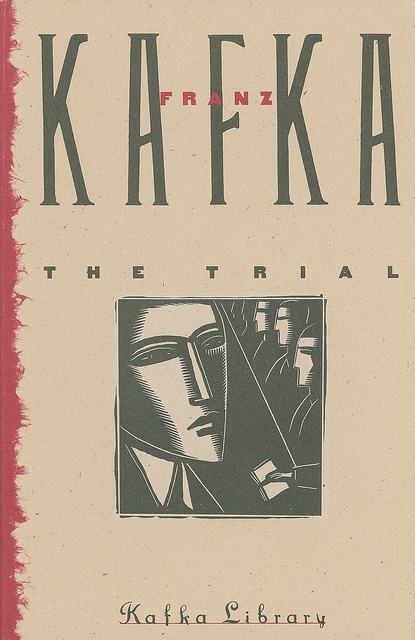
The Trial (Franz Kafka, 1925)
List: Jones/Newman
Published posthumously and somewhat unfinished, The Trial follows the doomed K. as he awakens to find himself arrested and no reason given. Thus he is plunged into a bureaucratic hell of lawyers toiling away through contradictions of logic, a legal system that wants to be as inobtrusive as possible while condemning the unguilty, family and co-workers who both seem totally unworried and extremely concerned of K.’s seemingly never-ending trial. The plot, such as it is, is highly episodic, following K.’s progress or lack thereof as he attempts to negotiate the existential quagmire he has found himself in.
I had read Kafka’s Metamorphosis and Other Stories collection and very much enjoyed Kafka’s dark, bleak sense of absurdist humor in much of his work, and we see it on full display here as well. I could talk about all the different ways people have interpreted The Trial and how it has served as a seminal influence on modern dystopian sci-fi (Gilliam’s Brazil for example seems very much of a piece with it) but lots of people have already done that. I want to talk about how this book affected me specifically. I found The Trial to be maddening, funny and baffling in equal measure. Seriously, I have nightmares about these kinds of situations that K. finds himself in. This book definitely started to trigger my anxiety at times. Kafka willfully leads us into conversations that go in circles with no purpose or meaning. I think his intent is to willfully perplex and irritate, and I think he succeeds admirably. Having said that, you can tell the book was left unfinished with some characters and plot threads randomly disappearing rather abruptly at times. The copy I have includes a post-script about the different translations that have been put together over the years and how each interpreted Kafka’s original work, and that was an interesting section just to see how much the final product depends on the translator involved. Different versions of the novel would exclude and move around whole chapters at times, giving the book an even more disorienting and confusing experience. Somehow I feel like Kafka would have been ok with this.
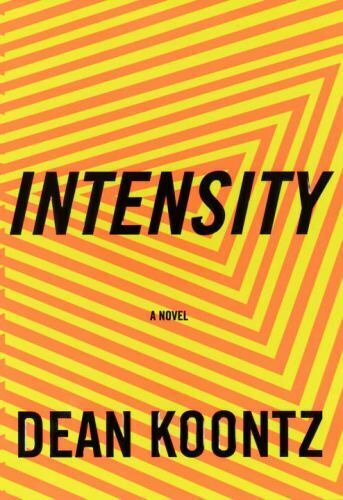
Intensity (Dean Koontz, 1995)
List: NPR
Chyna Shepherd is a psychologically damaged grad student with a troubled childhood who agrees to go visit the family of her best friend Laura for the weekend. Everything is going great and Chyna begins to love the family she never had when events take a grim and grisly turn. Serial killer Edgler Vess breaks into the home in the night and brutally murders everyone inside except Laura and Chyna. Chyna finds Laura tied up and tells her she’s going to get help only to come back and find that Laura has been taken to Vess’ motor home outside. Chyna sneaks into the RV in an attempt to rescue her friend only to find her dead. Before she can escape, Vess hops in the vehicle and drives off with Chyna hidden inside. Thus begins a hellish cat-and-mouse game where Chyna must not only survive but rescue a girl she discovers Vess has kept alive and taken prisoner.
Well, I never thought I’d come to this point, but here we are. A Dean Koontz book that I actually liked. What Koontz has done here is stripped a thriller down to its bare essentials. We have a minimal amount of setup (where some of Koontz’ more terrible dialogue tendencies show their ugly mugs) but once Vess breaks into Laura’s family’s house and starts killing, the book is almost constant tension and action from beginning to end. What results is a lean, mean novel that discards or hides many of Koontz’ worst tendencies like paper thin characters and abysmally awful dialogue that sounds like something from a bad TV movie and focuses down on what he is actually pretty good at writing, that being well-paced suspense sequences. Some of Vess’ inner monologues still come across as cheesy (count how many times he says the title of the book) and still has some of Koontz’ icky tendencies to shoehorn sexual abuse into the plot, but on the whole I’m glad I saved this as the final Koontz book to read for this big horror project. I’m not saying Intensity is a masterpiece by any stretch of the imagination, but for once, it’s nice to read a Koontz book that I felt like wasn’t a total waste of time. Now if that isn’t a ringing endorsement, I don’t know what is!

